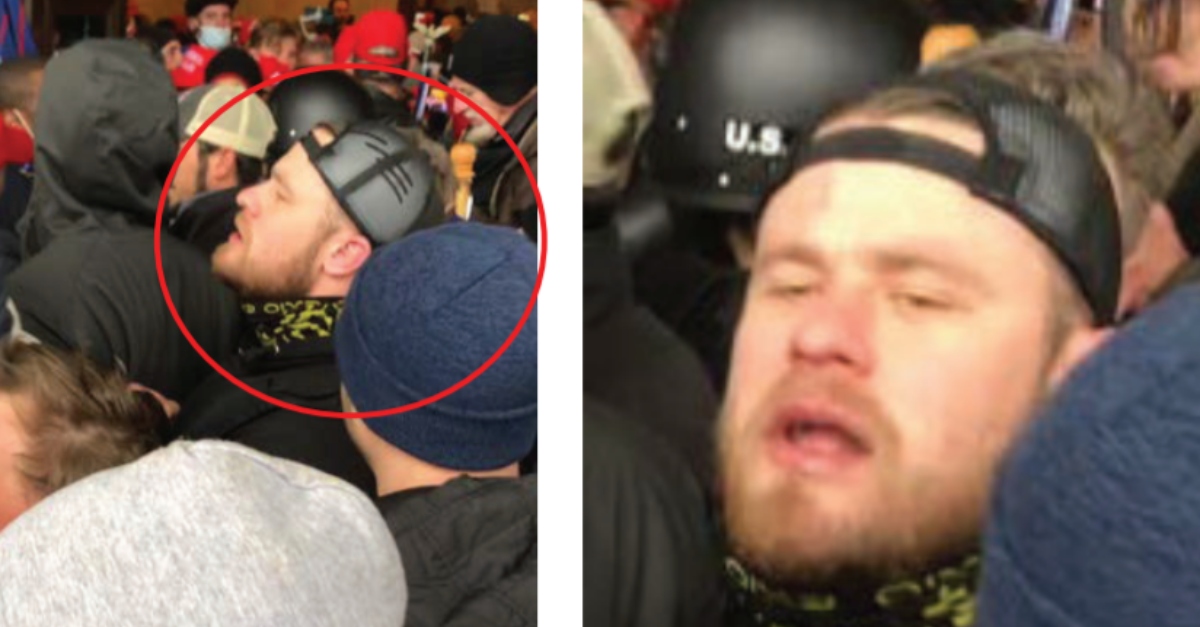
Image via FBI
A federal judge has denied a request from a high-profile Jan. 6 defendant to order the government to produce what the defendant claims is evidence that he is being prosecuted because of his association with the Proud Boys.
Ethan Nordean, in a motion filed in December, argued that he was being targeted because he’s associated with the group, which, according to federal prosecutors, self-identifies as a “pro-Western fraternal organization for men who refuse to apologize for creating the modern world, aka Western Chauvinists.”
Nordean said that the “selective prosecution” or “selective enforcement” efforts against him amounts to discrimination for exercising his First Amendment right to freedom of association.
The ruling against Nordean’s request, from U.S. District Judge Timothy Kelly, comes one day after Nordean, Proud Boys leader Enrique Tarrio, and three other co-defendants were charged with seditious conspiracy in a superseding indictment in connection with the Jan. 6 attack on the U.S. Capitol. That charge is widely considered the most serious brought so far in the federal government’s prosecution of Jan. 6 defendants, with a potential 20-year prison sentence.
More than 800 people have been charged with crimes in connection with the breach, which temporarily stopped Congress from certifying Joe Biden’s victory over Donald Trump in the 2020 presidential election and forced legislators to either evacuate or shelter in place.
Nordean had argued that there were “no material differences in fact or law” between those charged with misdemeanors on Jan. 6 and Nordean’s own actions, so his prosecution must be based on his association with the group.
“The government targets the political beliefs and perceived ideologies of political and cultural groups,” Nordean said in his motion, which asked Kelly to “direct the government to produce relevant documents and hold an evidentiary hearing in which officials overseeing this prosecution may corroborate or refute that they selectively prosecute Nordean.”
Kelly, a Trump appointee, declined.
Kelly noted that a defendant claiming selective enforcement or selective prosecution must show that the legal action against him had a “discriminatory effect” as well as a “discriminatory purpose” or intent.
“In other words,” Kelly wrote, a defendant “must show that the Government prosecuted, arrested, or otherwise investigated her ‘because of’ [their] membership in an identifiable group.”
Kelly said that Nordean had made a showing of neither.
“[Nordean] has not met the high standard for discovery on those claims,” Kelly wrote, finding that Nordean’s “evidence” that federal prosecutors targeted him for his connection to the Proud Boys was thin.
“Nordean must provide ‘some evidence’ that someone similarly situated to him and not an alleged member of the Proud Boys or similar group has not been charged with conspiracy in relation to the January 6 attack. He has not done so,” Kelly wrote, adding: “And that is understandable, given the comprehensive allegations against him and his alleged coconspirators.”
Nordean’s reliance on a press conference from then-acting U.S. Attorney Michael Sherwin about one week after Jan. 6, in which Sherwin said that the DOJ was focusing on building sedition and conspiracy cases, “does not suggest any sort of discriminatory motive for prosecuting Nordean—or anyone else,” Kelly wrote (emphasis in original).
Kelly also concluded that Nordean’s focus on a CBS News interview with Sherwin was misplaced.
“Nordean pulls some quotes out of context to try to create the sense that the Government had no evidence of any conspiracies but wanted to target members of ‘far-right militia’ groups to create a ‘shock and awe’ effect,” Kelly wrote. “But that is not what the then-former acting U.S. Attorney said … he later explained that the Government was still ‘trying to determine’ whether there was a ‘premeditated plan to breach the Capitol’ — perhaps as opposed to obstructing the proceedings inside in some other way — but detailed the evidence of planning the Government had found. None of these comments suggest, much less show, that the Government was prosecuting members of certain ‘political groups’ based on anything but the evidence that it uncovered.”
Nordean’s argument that “Jan. 6 charging statistics” also show a discriminatory intent” also failed, Kelly said.
The decision about “which specific charges to bring against the hundreds of January 6 defendants — including whether to bring a conspiracy charge — is the kind of discretionary judgment ‘essential to the criminal justice process’ for which raw statistics are an insufficient measure of discriminatory intent,” Kelly wrote.
Kelly also pointed out federal prosecutors have filed various conspiracy charges against several people who aren’t members of the Proud Boys or any extremist group — including Ronald Sandlin and Nathaniel DeGrave, Eric Munchel and Lisa Eisenhart, and Julian Khater and George Tanios — undermining Nordean’s attempt to link the conspiracy charge to the Proud Boys.
“And the flip side is true as well: some alleged Proud Boys are not charged with conspiracy,” Kelly wrote, citing defendants Joshua Pruitt and Arthur Jackman.
You can read Kelly’s ruling below.
[Images via FBI court filings.]